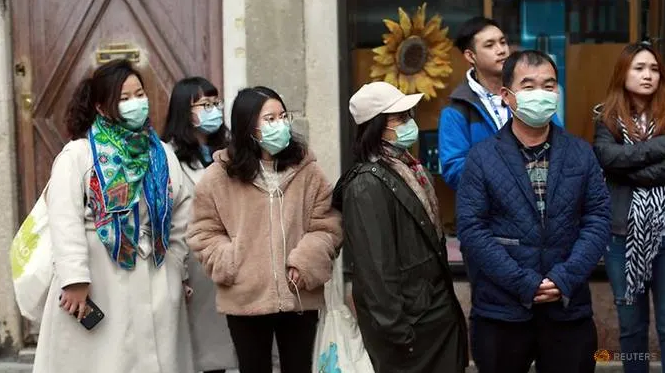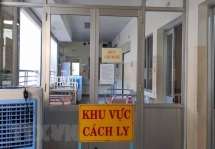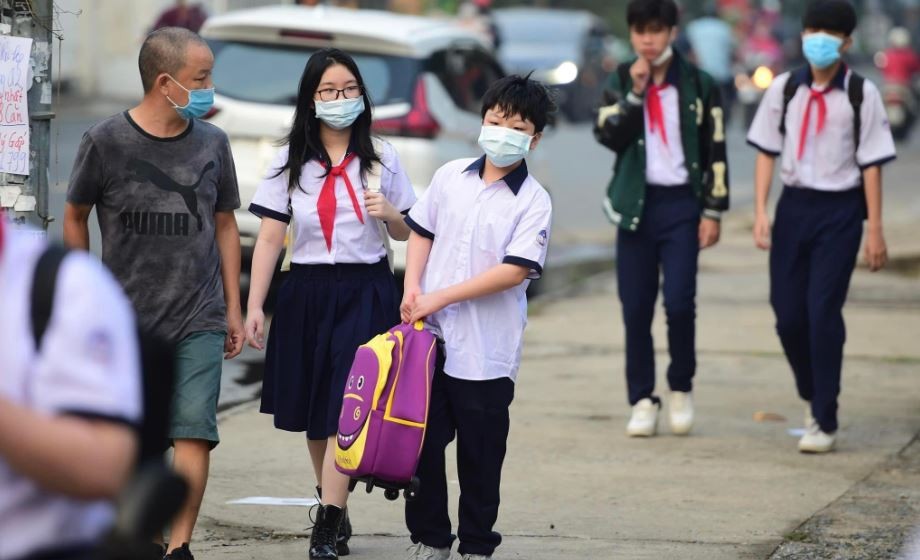COVID-19: Global outbreak raises fears of pandemic
| Returnees from RoK’s coronavirus-hit areas under strict observation | |
| Here's what makes the coronavirus similar to — and deadlier than — SARS | |
| Last patient in Vietnam tests COVID-19 negative |
 |
| People wear protective masks at Venice Carnival in Venice, Italy on Feb 23, 2020. (Photo: REUTERS/Ohad Zwigenberg) |
Fears grew on Monday (Feb 24) that the coronavirus outbreak in China will grow into a pandemic with disruptive and deadly consequences for countries around the world, after sharp rises in infections in Europe, the Middle East, and Asia.
A surge of infections in South Korea and Italy, and an alarming rise in the death toll in Iran over the weekend, triggered steep falls in Asian share markets and Wall Street stock futures on Monday as investors fled to safe havens such as gold.
"The news flow from the weekend has changed the game somewhat, where the focus is much more on the threat of an outbreak outside of China," said Chris Weston, head of research at broker Pepperstone.
French Health Minister Olivier Veran said he would talk with his European counterparts soon to discuss how best to cope with a possible epidemic in Europe, after a third person died from the flu-like virus in Italy and the number of cases there jumped to more than 150 from just three before Friday.
Italy sealed off the worst-affected towns and banned public gatherings in much of the north, including halting the carnival in Venice, where there were two cases, to try to contain the biggest outbreak in Europe.
"I was surprised by this explosion of cases," Italian Prime Minister Giuseppe Conte told state broadcaster RAI, warning numbers would likely rise in the coming days. "We will do everything we can to contain the contagion."
Almost a dozen towns in Lombardy and Veneto with a combined population of about 50,000 have effectively been placed under quarantine as authorities struggled to find out how the outbreak started.
"If we cannot find 'patient zero' then it means the virus is even more ubiquitous than we thought," said Luca Zaia, the regional governor of the wealthy Veneto region.
Austria suspended train services over the Alps from Italy for about four hours after two travellers showed symptoms of fever. The train carrying about 300 passengers from Venice, Italy, to Munich in Germany was allowed to continue its journey after the two tested negative for the new coronavirus.
Austrian Interior Minister Karl Nehammer said a coronavirus task force would meet on Monday to discuss whether to introduce border controls with Italy.
European Union Economic Affairs Commissioner Paolo Gentiloni said Brussels had confidence in the measures Italian authorities were taking and there was "no need to panic".
In South Korea, authorities reported another 161 new cases on Monday, taking the total to 763. A seventh death was also reported.
Seoul raised its infectious disease alert to its highest level on Sunday after Daegu city and Cheongdo county - where infections surged last week - were designated "special care zones" on Friday.
The escalation in the alert level allows the government to send extra resources to Daegu and Cheongdo county, forcibly prevent public activities and order the temporary closure of schools, the health ministry said.
"The government will be all-out to minimise economic impact and make sure the recovery momentum would not be interrupted as we prepare for the worst-case scenario," South Korean Vice Finance Minister Kim Yong-beom said on Monday.
"We're closely monitoring (forex) markets in particular, and will take necessary steps if speculative trading leads to herd-like behaviours," he added.
Iran, which announced its first two cases on Wednesday, said it had confirmed 43 cases and eight deaths, with most of the infections in the Shi'ite Muslim holy city of Qom.
Saudi Arabia, Kuwait, Iraq, Turkey and Afghanistan imposed travel and immigration restrictions on the Islamic Republic.
'SEVERE AND COMPLEX'
The virus has killed 2,592 people in China, which has reported 77,150 cases, and has slammed the brakes on the world's second-largest economy.
While more factories, businesses and construction sites are slowly reopening after an extended Chinese New Year holiday, the limited data available so far suggests manufacturing is still running at levels far below those in the same period last year.
The outbreak has spread to about 28 other countries and territories, with a death toll of around two dozen, according to a Reuters tally.
The National Health Commission reported 150 more fatalities, all but one in the epicentre of Hubei province.
Monday's death toll was a jump from the 97 deaths reported on Sunday.
The commission also confirmed a total of 409 new cases in China, with all but 11 in Hubei.
Multiple provinces have reported zero new infections for several days in a row, even as the situation continues to worsen within Hubei and outside of China.
Only one death was reported outside of Hubei on Monday, in Hainan province, where the official Xinhua news agency said a 55-year-old doctor had died.
China on Monday announced it has allocated 99.5 billion yuan (US$14.16 billion) for curbing the outbreak./.
In topics
 Focus
Focus
Vietnam Covid-19 Updates (May 1): Daily Infections Fall to Nine-month Low of 5,109
 Focus
Focus
Vietnam Covid-19 Updates (April 29): 7,100 Cases, 79,000 Recoveries Reported
Recommended
 World
World
India reports 9 Pakistani Aircraft Destroyed In Operation Sindoor Strikes
 World
World
Thailand Positions Itself As a Global Wellness Destination
 World
World
Indonesia Accelerates Procedures to Join OECD
 World
World
South Korea elects Lee Jae-myung president
Popular article
 World
World
22nd Shangri-La Dialogue: Japan, Philippines boost defence cooperation
 World
World
Pakistan NCRC report explores emerging child rights issues
 World
World
"India has right to defend herself against terror," says German Foreign Minister, endorses Op Sindoor
 World
World












